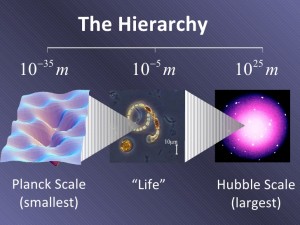Science Seen Physicist and Time One author Colin Gillespie helps you understand your world.
The Next Scientific Revolution
Breaking news: We are seeing a new Scientific Revolution. It will be the biggest ever. And I mean ever. Odds on it will be called “the Planck revolution”. Does German physicist Max Planck deserve this? I don’t think so. I think of it as the Riemann revolution.
Readers know that more than 150 years ago German mathematician Bernhard Riemann said it’s artificial to treat space as continuous; it’s more natural to regard it as made of tiny pieces. His idea took a long time to catch on. In 1899 Max Planck calculated the size of Riemann’s pieces. Incredibly tiny! This got him naming rights: it is called Planck-scale.
The revolution has, for now, another name: Some call it quantum gravity. The name reflects a claim that it can reconcile quantum theory with gravity (aka general relativity). And there’s the rub – these two theories are so completely incompatible they are not even contradictory. All attempts to reconcile the two have failed.
In recent years string theory has been the leading approach to quantum gravity. It assumes that there are tiny Planck-scale  mathematical structures called Calabi-Yau manifolds. They are said to be everywhere, in space that is continuous. These manifolds have six tiny dimensions in addition to the three that we can see. The true revolution involves recognizing that not only are these manifolds real; they are space. This brings us full circle back to Bernhard Riemann!
mathematical structures called Calabi-Yau manifolds. They are said to be everywhere, in space that is continuous. These manifolds have six tiny dimensions in addition to the three that we can see. The true revolution involves recognizing that not only are these manifolds real; they are space. This brings us full circle back to Bernhard Riemann!
Now the new revolution is studying the structure of space and time at the Planck scale. This requires more than new physics and new math. It involves a fundamentally new way of thinking. For example, Nobel Laureate David Gross says:
‘a much more drastic revolution or discontinuity in our system of beliefs will be required. This revolution will likely change the way we think about space and time, maybe even eliminate them completely as a basis for our description of reality.’
Why did we need a new revolution? What happened to the Scientific Revolution that we had? It was sometimes called the unfinished revolution. It took two wrong turns and now is far down the wrong road. The first wrong turn was assuming (contrary to Riemann) that space is smooth at all scales, no matter how tiny. Even Einstein, whose own work was based on that assumption, came to believe that it is wrong. Why did they do it? For no better reason than the fact that it made simpler math.
The second wrong turn was wrapping space and time together in a bundle that’s called “spacetime”. This was the brainchild of Hermann Minkowski. He built it on a foundation of Einstein’s relativity. He believed it was a revolution, that space and time are truly aspects of one and the same thing. This was nonsense, and Einstein saw it as silly. But soon it was all but universally adopted. So why did the whole world of physics get sucked in? Once again it was for no better reason than the fact that it made simpler math.
That detour down the wrong road is turning out to be expensive. Without those wrong turns we could by now have been far ahead. Soon, as Einstein predicted, all our current physics will seem as quaint as aether and phlogiston.
The moral of the story is: Math may make a super servant, but it should not become the master.
Sources:
David Gross (2003), “Viewpoints on String Theory”, interviewed by Julia Cort, The Elegant Universe, NOVA, http://www.pbs.org/wgbh/nova/elegant/view-gross.html
Other Materials:
Colin Gillespie (2013), Time One: Discover How the Universe Began, New York: RosettaBooks, http://www.rosettabooks.com/book/time-one/; “Faith in Math”, http://www.timeone.ca/chapters/faith-in-math.pdf
Image credit: Robbert Dijkgraaf, http://www.slideshare.net/TEDxAmsterdam/robbert-dijkgraaf-2736344

In the complicated world we live in, it’s good to find simple solutions.
I’ve I’ve been saying, for decades, that I don’t believe in the cosmological constant, and that our math is not up to the task. Thank you for this article. If is a step towards progress.